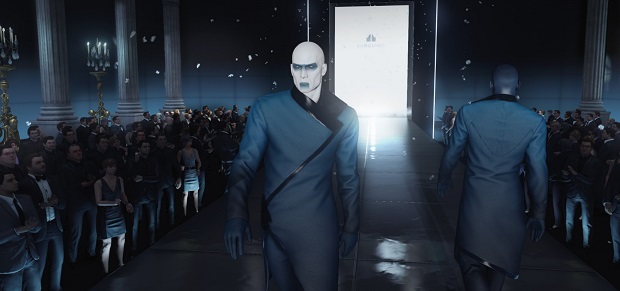RPS-O-Chat: Hitman Beta
This post was originally published as part of our Supporter Program.
The Hitman beta is out and, if you've pre ordered (don't pre-order), you can play it right now. It contains the game's two prologue missions, which act as a tutorial and as a mission statement for both Agent 47 and for the game's attempt to take the series back to its systemic, murderous roots. I've played it. Adam's played it - and more besides. Now we have gathered to discuss our thoughts.
Graham: I think the scariest word in the intro is "tutorial", because I'm old and I remember when the Hitman: Blood Money demo was the awful, scripted tutorial mission. I'm relieved that they're not so stupid as to repeat the same mistake: this is a tutorial, but one where you can ignore the onscreen prompts at least somewhat and set within missions in which you're both assassinating and able to do so via multiple methods. It's proper Hitman, in other words - even though the missions take place in a testing arena, in which a yacht and a military compound have been reconstructed indoors for the purposes of testing you. Which is a weird and pleasing setup.
I made a man do a sick then killed him while he was in the bathroom. What did you think?
Adam: I tampered with an ejection seat and then cackled as a man attempted to use it. I also killed a man while he was in a bathroom but he had followed me to the bathroom because he saw me dragging another man into the bathroom. And then I decided to try and put every person on the boat in that same bathroom. I figure 47 is a compulsive hoarder at heart.
I thought these were decent as far as tutorial levels go. I learned about the limits of disguises and got a good handle on the UI, which delivers essential information about your relative safety and visibility. But I also spent a fair bit of time experimenting with the limits of the AI. It’s important to know how NPCs will react in a Hitman game. They’re not going to behave like real people because that would be both far too complex and far too unpredictable, so I needed to know how they would behave.
I wasn’t convinced. Not by their credibility as people, but by their entertainment value. It seems too easy to manipulate them within a narrow set of reactions but too difficult to cause chain reactions of action and reaction. What did you make of it all?
Graham: I too spotted problems with AI. I touched on this a little last week (supporter only), spurred by a situation where an ever-growing crowd of NPCs were watching me wipe down a bar, looping endlessly through being suspicious and being reassured by my attempts to blend in. Like this:
(for u rn: https://www.gfycat.com/EnchantedFeistyCoqui)
I decided I could forgive it this. It felt like a situation where I'd already screwed up by getting too close to my target, and it would have been no less silly if the ability to blend in at that point had wholly dissuaded him of my intent to do wrong. As it is, it afforded me the opportunity to stop a think for a second about what my next move should be.
Which is maybe the larger problem: I couldn't find any good next moves. I could run away and hide and wait for everyone to calm down, but that's unsatisfying. I couldn't see a good way to manipulate this particular situation.
I had hoped that might be because it's an early game tutorial level, and so perhaps my skillset is still to grow, but I suspect/fear it might be simply that there is nothing you can do in that situation but run and wait or reload. Is it your experience that all opportunities for exploiting AI behaviour come from the scripted and explicitly named 'Opportunities', a la tampering with the fighter jet ejector seat?
Adam: No - in the proper sandbox of the game’s first mission, which I’ve played and written about, there’s more room to tinker with the actual AI systems. That’s partly because there’s more space and more people, so you can lead people from one place to another, and throw the cat among the pigeons somewhat. The Opportunities are a new feature so it makes sense for the tutorial to stack several within its compact mission areas - it’s teaching players how to work with them.
But I did find, in both the tutorial areas and the main game, that many of the issues I had with AI behaviour and objectives stemmed from the way Opportunities are at the heart of the assassinations. It’s very difficult to improvise successfully once a scripted sequence has been triggered, which made me feel as if I was locking myself into a sequence of events rather than nudging at systems as I went. And when I say ‘successfully’, I don’t mean victoriously, I mean effectively. Entertainingly.
I’m forgiving of odd behaviour from AI but much less forgiving of behaviour that doesn’t lead to new opportunities or oddities. There are lots of moving parts in Hitman but there’s less confusion and chaos than I’d hoped to find. What did you make of the actual level designs?
Graham: I liked them, the boat level especially. It feels tightly wound: three levels, each of which require their own security clearance/costume, and therefore three groups you can disguise yourself as and then need to cleverly avoid or blend in among to stop arousing suspicion. Through exploring the side-rooms and corridors of the ship, I also found less scripted opportunities for mischief, including cutting power, routes towards costumes that didn't involve beating someone up, and the aforementioned emetic rat poison, which I used to send my assassination target gripping his stomach towards the bathroom.
It felt, whether true or not, as if there were lots of other ways to approach the situation than the two I used. Which is all I really want: in most instances, I'm not going to re-play a Hitman level. I want the illusion of choice even if the real thing isn't present.
The second mission on the military base felt a little less interesting, in large part because the odds were deliberately stacked against you. I find Hitman a million times less interesting the second I'm hiding among soldiers, rather than civilians.
I hear the full missions are considerably larger, however?
Adam: Much larger. And while it’s great to have a big play area, the scale comes with its own problems. It’s much more obvious when a disturbance is localised, for example, and doesn’t cause reactions in neighbouring rooms. If a body - a DEAD BODY - is discovered in a toilet at a fashion show, it seems odd that the guards would express alarm, search nearby rooms and then just carry on as if nothing had happened without alerting their chums spread around the grounds.
There’s a nice mix of civilian areas and ‘military’ areas, however. It’s fun to move from a place where your actions bring about slightly amused reactions - “why is that man throwing coins into bushes?” - and areas where the slightest mis-step can bring down a hail of suspicion and bullets. And it’s reassuring that the different types of NPC can and do display behaviours that are at least slightly fitting to their station.
I agree that the boat level is the most successful of the two tutorial levels though and I think that is down to the tight design. There’s enough there to allow for experimentation, within a small but densely populated space. There are plenty of opportunities for both smart and silly infiltrations and other actions. I worry that the larger area, in the Paris sandbox, loses some of that. To borrow a radio term, there’s no dead air in the boat level.
You mentioned the difficulty in the base infiltration. It is overly punishing, isn’t it? I found the opening in particular to be a pain in the backside. Very restrictive.
Graham: As restrictive as Agent 47's choke grip. There are plot reasons for that, and perhaps good tutorial reasons to test that you know what's what, but I found it both restrictive and a little unfair. There was a point, for example, in which I silently choked out a man in a courtyard and another guard 30 feet away with his back to me turned around and gunned me down. I'm not sure what tipped him off, but even if I misidentified him as stationary when he was really patrolling, that sort of stuff isn't fun to me.
What you described above, of large levels where information doesn't spread between zones, actually sounds more like what I'm after. I want the stupidity so I can exploit it. My one complaint about the boat level's relative tightness was that it seemed to close up its interesting options as soon as you were spotted, at least until you'd gone and hid behind a bin for a few minutes. The thought that being spotted might simply close off a route and force me to find a new way towards my intended outcome sounds more appealing.
Playing this has made me start to re-consider Hitman: Blood Money. It's my favourite Hitman game, because it is the best Hitman game, but it had some of these same problems. It was always a game that felt more like it was about selecting one of a number of optional but fixed paths rather than playing with AI. It always tolerated a lot of weirdness and kept guards within their prescribed zones. It simply never bothered me at the time. I'm trying to decide whether my greater suspicion about it this time is because they're doing something different - in level design or elsewhere - or whether it's because other games have come along and done some of these things in different or outright better ways.
Adam: The problem with the Paris level might come down to the aftermath. Because you can be active for much longer periods, the lack of any sensible response to your activities becomes much more obvious. And because the whole level is built around two big scripted events - a fashion show and an illicit auction - I was irritated by the lack of overlap between the two. Trigger certain reactions at the fashion show and the wider systems of the game don’t feel their effect and the auction continues and if you convert the catwalk into a bloodbath, you can still find pockets of the level continuing as if nothing had happened.
My favourite Hitman moments have always been weird or predictable collisions of action and reaction, cause and effect. When something like your uncanny guard situation happens, my suspension of disbelief collapses. Or crumbles a little, at the very least. I found that a lot during my Parisian adventures.
There’s also a distinct possibility that mucking up one part of the level often leads to a shoot-out, which would probably cause me to restart after a few attempts even if I survived. It’s not that I mind a spot of panicked shooting, it’s that I don’t feel any satisfaction completing objectives once I’m stepping over piles of bodies to get from one room to the next. It feels like the game is turning a blind eye, not because it doesn’t want to interrupt my fun, but because it’s not quite sure how to handle the aftermath of a situation without simply forcing a restart or throwing countless bullets into my baldness until I die.
Graham: It's definitely not a game About That. Much more so than other games that allow for stealthy assassination, such as Dishonored and Metal Gear Solid, both of which offer viable violent playthroughs. Hitman doesn't do that and I wouldn't want it to, but it does put ten times more pressure on those AI systems to hold up the suspension of disbelief.
I'd also reload after all-out shooting broke out, but broadly I think I'm OK with stepping over a few oddly unnoticed bodies if it means the game doesn't disrupt my flow. On the evidence of the beta, I'm cautiously optimistic about the full game - or at least the fullness of its first episode.
Adam: I’m less optimistic. I was hoping for greatness and can feel myself preparing to settle for something that’s more good than bad. That’d be enough though - for all my complaints, it still feels good to have another Hitman that is at least aiming to be a proper stealth game.
Hitman's first episode is due for release on March 11th.












